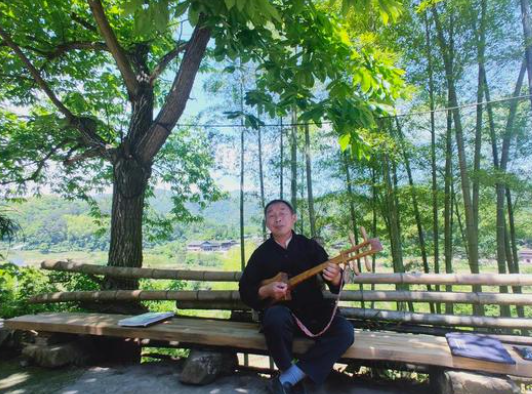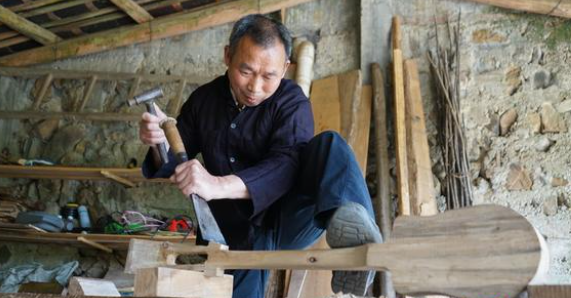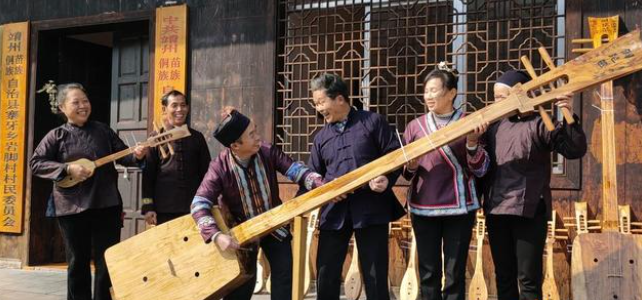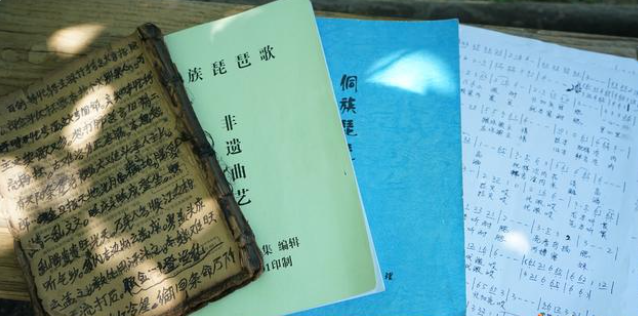Huaihua Jingzhou Wu Yongde: "Inheritance, the wish has never been extinguished
A melodious song came from the home of Wu Yongde, the inheritor of Dong Pipa craftsmanship in Yanjiao Dong Village, Zhaiya Township, Jingzhou Miao and Dong Autonomous County. After singing the song, 59-year-old Wu Yongde talked about Pipa and the past of his youth. As soon as the chatterbox opened, he continued to talk...

"I was only six years old when I first came into contact with the pipa in my memory, and the pipa I used was of a normal size, the same as this one." Wu Yongde stroked the pipa in his arms and recalled with a smile the first time he came into contact with the pipa The scene, "There are guests at home, and everyone sits around and sings Dong songs. The ding ding dong dong sound of the pipa and the melodious and lyrical singing deeply moved me."
The 6-year-old child couldn't hold the adult's pipa, and his chaotic appearance immediately caused a burst of laughter, and the fate of Wu Yongde and the Dong pipa began...
First acquaintance, from now on the pipa as a companion
Singing is the most popular form of entertainment for the local ethnic minorities. Old people teach songs, young people sing songs, and young people learn songs. It was once a unique scenery of Dong Village.
The ancestors of Wu Yongde’s family are all well-known Dong singers. He has been in love with Dong songs since he was a child. When he was fifteen years old in junior high school, he made his first Dong pipa with tools.
"The first pipa I made was given to my father." Wu Yongde said that the first pipa was given to his father, firstly, to express his determination to learn and sing the Dong pipa well, and secondly, to thank his father for his enlightenment educate.

The composition of the pipa seems simple, but the test is the heart of the craftsman.
"The pipa of the Dong nationality is composed of the head, the stem, the peg, the resonance box and the chords." Wu Yongde said while pushing the plane in the workshop that the production process of the pipa of the Dong nationality is very particular, from material selection, design, planing, line drawing, to Drilling, sawing, shaping, and finally winding, tuning, every step is not sloppy.
On May 20, 2006, the Dong nationality pipa song was approved by the State Council to be included in the first batch of national intangible cultural heritage list. The call for protection of the pipa song has gradually increased. Wu Yongde believes that the singing should be protected, as should the accompanying musical instruments. To this end, he practiced himself and buried the whole person in the pile of pipa.
In order to make the craft more delicate, Wu Yongde has summed up a lot of experience in the process of making pipa. For example, "one material, two lines and three holes" means that the planing material should be flat, smooth and square, the drawing line should be straight and accurate, and the mortise should be square, vertical and transparent; "The planer jumps", which means that the long planer is sharp and will whistle when the planer is pushed, and the short planer describes the planing knife jumping happily on the surface of the board.
"A pipa is all made by hand, and it takes three days. Because the materials are hard to find, the production is time-consuming and labor-intensive. Only when there is demand can the material be cut." Wu Yongde introduced that the best wood for making a pipa is catalpa, but catalpa is scarce nowadays. , only to use camphor wood to make the body of the violin. A good pipa must achieve a harmonious and unified sound, and the sound is gentle and loud, in order to demonstrate the production level of Dong musical instruments.

On January 18, 2022, the first live broadcast of the Hunan area of the "Hometown has good things" rural revitalization and assistance activity officially hosted by Kuaishou was held in Yanjiao Dong Village. At the event site, a giant Dong pipa with a length of 3.6 meters and a width of 0.9 meters attracted the attention of all present.
"It took nearly 20 days to make this giant pipa. It took a lot of effort to cut and transport logs, and I used up two light saws." Wu Yongde talked about the process of making the giant pipa, his face full of energy, "I am going to make a fortune for this giant pipa. Pipa declared the Guinness Book of World Records and created a tourism highlight for the village."
The giant pipa is very difficult for most people to pick up, but Wu Yongde not only used the pipa freely, but also performed a lot of performances. The superb skills are breathtaking.
"Only when the sound of the qin and the human voice are perfectly blended, can the true taste of the Dong people be sung." Wu Yongde said that to understand Pipa songs is to understand the Dong Pipa to a certain extent, because in the Dong Pipa songs, the singing and the Pipa are highly integrated.
Accompanying, the original intention has never changed
On June 12, 2015, the large-scale original ecological sitcom "The Silk Road Daughter Country" premiered at the Drum Tower Square in Yanjiao Dongzhai, Jingzhou. Nearly 60 actors who participated in the performance were all aboriginal Dong people from Yanjiao Dongzhai. Wu Yongde also made his debut to perform for the public.
The melodrama is based on the commercial culture of the Southern Silk Road and the matriarchal culture of the ancient "Daughter Country", and takes the story of the ancient caravan passing through the "Daughter Country" in Yanjiao Dong Village as the narrative clue. The beauty and legend of "Lu Nuguo" shows the colorful historical tradition and national culture of the Dong nationality.
The entire performance lasted for more than 20 minutes, attracting nearly 10,000 tourists to the scene to watch.
"I was on stage for the first time, and when I saw the crowded audience, I couldn't help but feel a little nervous." Wu Yongde was a little nervous when he first appeared on stage, but as the performance went on, he gradually entered the state, immersed in the performance, and the performance gradually Into the good.
After the performance, there was thunderous applause from the audience. The audience's affirmation inspired Wu Yongde and decided to continue the performance. This performance lasted for 7 years.
Wu Yongde introduced that the pipa song is a vivid record of the living customs of generations of singers, and it is the essence of Dong culture. It is not only a form of entertainment, but also a way of socializing for the Dong people. Through the pipa, young men and women can talk to each other. However, because the Dong people do not have their own national script, countless classic repertoires are often gradually lost due to some accidental reasons.

Wu Yongde still remembers that the pipa songs were taught by the ancestors by word of mouth, and it was not until the 1960s that they began to use the homophonic Chinese characters to record. In order to pass on the song better, Wu Yongde also adopted the "Chinese character recording method of Dong sounds" (a method of using Chinese homophones or near-sound characters to record the lyrics of Dong songs) while making pipa, and combined some pipa songs, Record and save in Chinese characters.
Over the past decades, Wu Yongde has collected and organized hundreds of classic pieces of Dong Pipa songs, and at the same time compiled dozens of pieces by himself. Although Wu Yongde regards them as treasures more valuable than his own life, as long as someone wants to learn, he will teach them without reservation.
Inheritance, the wish has never been extinguished
"The young people in the village now like to listen to popular songs. In addition, most of the young people go out to work, and fewer and fewer people come to inherit the pipa of the Dong nationality." Wu Yongde, who loves the culture of the Dong nationality, also has his own concerns, worried that the national culture will be lost. , he hopes to spread and popularize the Dong Pipa through his own efforts.
In recent years, with Jingzhou County's emphasis on intangible cultural heritage cultural activities and extensive publicity, intangible cultural heritage culture has become a "favorite" for many young people, and more and more people are participating in it.
On November 25, 2021, Jingzhou County Culture, Tourism, Radio, Television and Sports Bureau and Jingzhou County Cultural Center organized a training class "Jingzhou County Inheritance of Dong Pipa into Campus" at Furong Middle School in the county. Wu Yongde was invited to become a teacher.
"Hello, classmates!" On the podium for the first time, looking at the curious eyes and high enthusiasm of the more than 20 people in the audience, Wu Yongde's heart was filled with enthusiasm.
In order to facilitate teaching, Wu Yongde compiled the Dong Pipa Song Teaching Book of Pipa Songs, the methods of playing and singing, and the rhythm of Pipa songs, and took advantage of the opportunity to teach at school every Thursday and Friday to teach students who love Dong culture.
"My dream has come true." Wu Yongde said with satisfaction that as the intangible cultural heritage entered the campus, as a farmer, he stepped onto the three-foot podium to teach the students the pipa and Dong culture of the Dong nationality, and he was already very satisfied.
From learning songs when he was a child, to sing in front of the teacher, going on stage, and now teaching and spreading songs, Dong Pipa has become a part of Wu Yongde's life. In order to better inherit the Dong Pipa song culture, he said, " As long as someone wants to learn, as long as someone loves it, as long as there is time, I will definitely teach."
 渝公网安备 50010702504639号
渝公网安备 50010702504639号